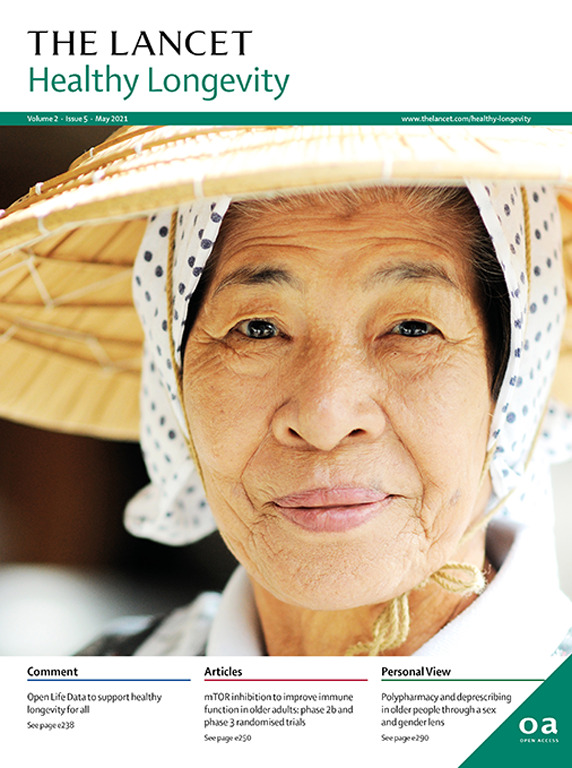新的社会心理目标设定和人工支持干预对痴呆患者独立性(NIDUS-Family)与目标设定和常规护理的成本效用:一项随机对照试验中的经济评估
IF 14.6
Q1 GERIATRICS & GERONTOLOGY
引用次数: 0
摘要
背景:NIDUS-Family是一种社会心理和行为干预,包括6至8次会议,由非临床调解员提供,并根据痴呆患者及其无薪或家庭照顾者设定的目标进行定制。干预已被证明是有效的实现个性化的客户目标。目前的研究旨在确定干预是否具有成本效益。方法:在一项双臂、单面、多地点、优势随机对照试验中,我们招募了302名住在自己家中的痴呆症患者及其家庭护理人员,这些患者来自英国国家卫生服务社区环境和社会及印刷媒体。参与者被随机分配(2:1)到nidus -家庭干预组或对照组(设定目标和常规护理)组。随机化被阻断并分层,通过远程网络系统进行分配。我们从健康和社会护理的角度和社会角度(另外包括家庭护理时间和自付费用)计算了NIDUS-Family对痴呆症患者具有成本效益的可能性,与常规护理相比,额外的质量调整生命年的决策阈值为20,000 - 30,000英镑,超过12个月。使用意向治疗人群进行分析。本研究已注册ISRCTN, ISRCTN11425138,并已完成。研究结果:在2020年4月30日至2022年5月9日期间,我们随机将204名参与者(109名[53%]女性和95名[47%]男性)分配到干预组,98名(60名[61%]女性和38名[39%]男性)分配到对照组。218名(72%)6个月的参与者和178名(59%)12个月的参与者提供了成本数据。在2万英镑和3万英镑的决策阈值下,从健康和社会护理的角度来看,NIDUS-Family与常规护理相比具有成本效益的概率为89%,从社会角度来看,这一概率为87%。干预组参与者的累积成本平均比对照组参与者少8934英镑(37%)(95% CI - 59 460英镑至41 592英镑)。解释:NIDUS-Family是第一个从痴呆症患者的生活质量和临床效果的角度显示成本效益的个性化护理和支持干预,因此应成为痴呆症常规护理的一部分。资助:阿尔茨海默氏症协会。本文章由计算机程序翻译,如有差异,请以英文原文为准。
Cost-utility of a new psychosocial goal-setting and manualised support intervention for independence in dementia (NIDUS-Family) versus goal setting and routine care: an economic evaluation embedded within a randomised controlled trial
Background
NIDUS-Family is a psychosocial and behavioural intervention comprising six to eight sessions, delivered by non-clinical facilitators, and tailored to goals set by dyads of people with dementia and their unpaid or family carers. The intervention has been shown to be effective for attainment of personalised client goals. The current study aimed to determine whether the intervention is cost-effective.
Methods
In this cost-utility and cost-effectiveness analysis within a two-armed, single-masked, multisite, superiority randomised controlled trial, we recruited 302 people with dementia living in their own homes and their family carers from National Health Service community settings and social and print media across England. Participants were randomly allocated (2:1) to the NIDUS-Family intervention group or control (goal setting and routine care) group. Randomisation was blocked and site-stratified, with allocation by a remote web-based system. We calculated the probability that NIDUS-Family is cost-effective for a client with dementia based on quality-adjusted life-years from a health and social care perspective and from a societal perspective (additionally including family carer time and out-of-pocket costs), at £20 000–30 000 decision thresholds for additional quality-adjusted life-years compared with usual care over 12 months. Analyses were done using the intention-to-treat population. This study is registered with ISRCTN, ISRCTN11425138, and is completed.
Findings
Between April 30, 2020, and May 9, 2022, we randomly allocated 204 participants (109 [53%] women and 95 [47%] men) to the intervention group and 98 (60 [61%] women and 38 [39%] men) to the control group. 218 (72%) participants at 6 months and 178 (59%) at 12 months provided cost data. At both a £20 000 and £30 000 decision threshold, there was an 89% probability that NIDUS-Family was cost-effective compared with usual care from a health and social care perspective, and an 87% probability from a societal perspective. Intervention participants accrued on average £8934 (37%) less in costs than control participants (95% CI –£59 460 to £41 592).
Interpretation
NIDUS-Family is the first personalised care and support intervention to show both cost-effectiveness from the perspective of the quality of life of people with dementia as well as clinical effectiveness and should therefore be part of routine dementia care.
Funding
Alzheimer’s Society.
求助全文
通过发布文献求助,成功后即可免费获取论文全文。
去求助
来源期刊

Lancet Healthy Longevity
GERIATRICS & GERONTOLOGY-
CiteScore
16.30
自引率
2.30%
发文量
192
审稿时长
12 weeks
期刊介绍:
The Lancet Healthy Longevity, a gold open-access journal, focuses on clinically-relevant longevity and healthy aging research. It covers early-stage clinical research on aging mechanisms, epidemiological studies, and societal research on changing populations. The journal includes clinical trials across disciplines, particularly in gerontology and age-specific clinical guidelines. In line with the Lancet family tradition, it advocates for the rights of all to healthy lives, emphasizing original research likely to impact clinical practice or thinking. Clinical and policy reviews also contribute to shaping the discourse in this rapidly growing discipline.
 求助内容:
求助内容: 应助结果提醒方式:
应助结果提醒方式:


